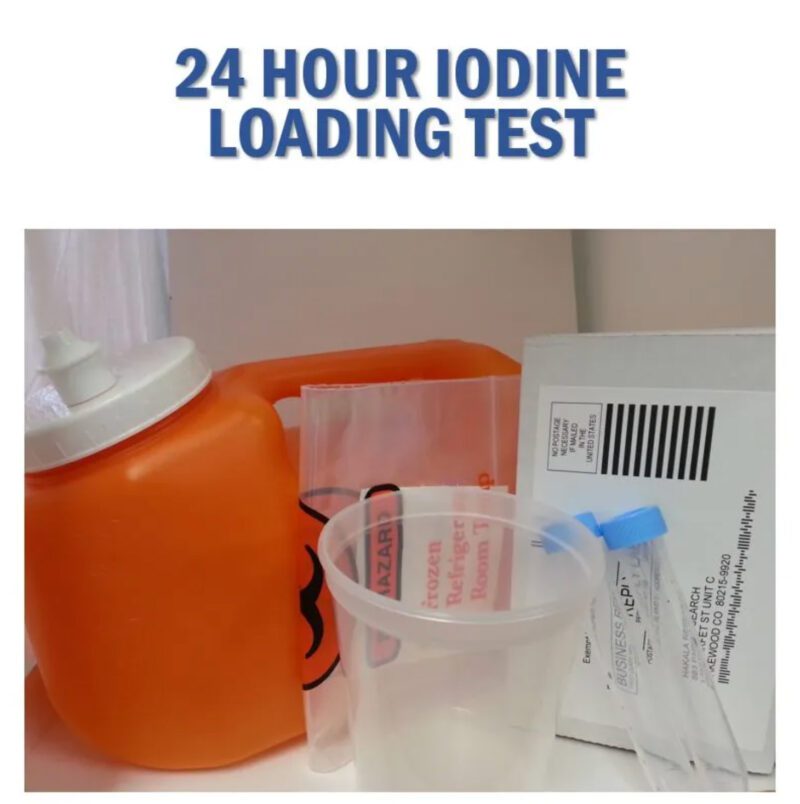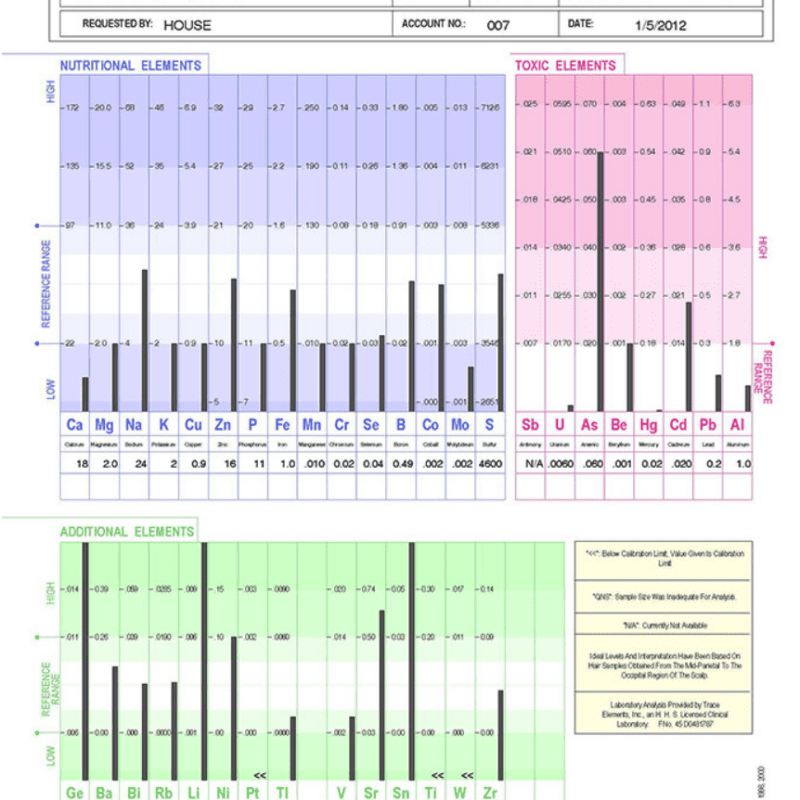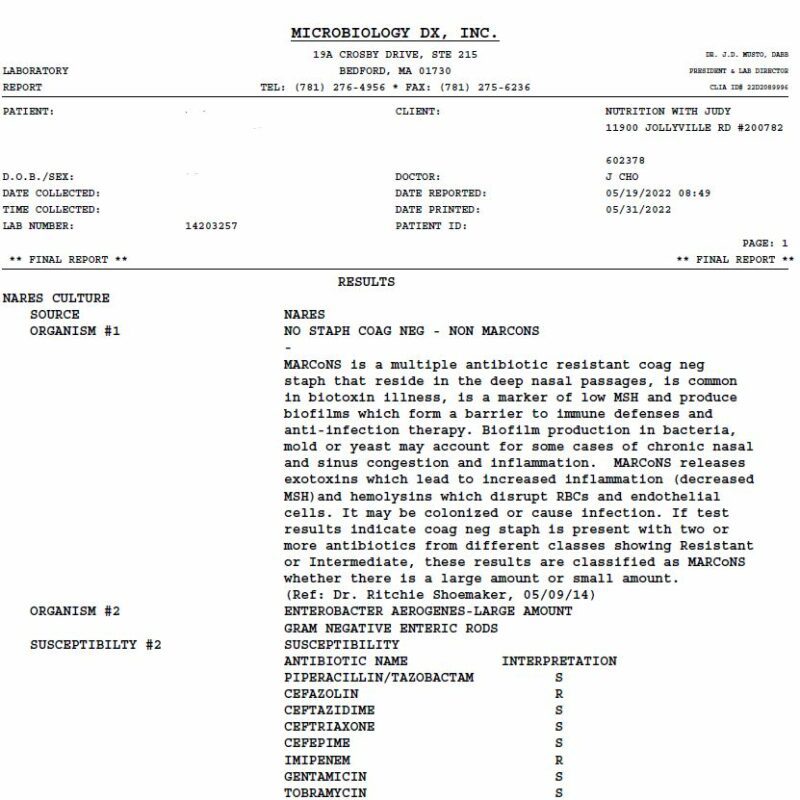Description
All tests from Nutrition with Judy include a detailed analysis (notes) that include Nutrition with Judy explanations, dietary and supplement recommendations, as well as customized next steps based on your test results.
The Iodine/Iodide Loading Test
This test is used to assess whole body sufficiency for the essential element iodine. It is recommended prior to and following 3 months on iodine supplementation.
Whole body sufficiency for iodine is assessed by an iodine/iodide loading test. The test consists of ingesting 4 tablets of a solid dosage form of Lugol (Iodoral), containing a total of 50 mg iodine/iodide.
Then urinary iodide levels are measured in the following 24 hr collection. The iodine/iodide loading test is based on the concept that the normally functioning human body has a mechanism to retain ingested iodine until whole body sufficiency for iodine is achieved.
During iodine supplementation (orthoiodosupplementation), a negative feedback mechanism is triggered that progressively adjusts the excretion of iodine to balance the intake. As the body iodine content increases, the percent of the iodine load retained decreases with a concomitant increase in the amount of iodide excreted in the 24 hr urine collection.
When whole body sufficiency for iodine is achieved, the absorbed iodine/iodide is quantitatively excreted as iodide in the urine (1- 3). In the U.S. population, the percent of iodine load excreted in the 24 hr urine collection prior to iodine supplementation averages 40% in more than 7,000 loading tests performed at FFP Laboratories and Hakala labs has said about 90% of Americans are deficient in iodine.
After 3 months of supplementation with 50 mg iodine/iodide/day, most non-obese subjects not exposed to excess goitrogens achieved whole body iodine sufficiency, arbitrarily defined as 90% or more of the iodine load excreted in the 24 hr urine collections. Adult subjects retained approximately 1.5 gm of iodine when they reach sufficiency.
A repeat loading test following 3 months on iodine supplementation is recommended.
The goal of iodine supplementation is not the treatment of disease, but the supply of optimal amounts of an essential nutrient for whole body sufficiency and for optimal mental and physical performances. Whole body sufficiency for iodine correlates well with overall wellbeing, and some subjects could tell when they achieved sufficiency even before knowing the results of the test. Iodine sufficiency was associated with a sense of overall wellbeing, lifting of a brain fog, feeling warmer in cold environments, increased energy, needing less sleep, achieving more in less time, experiencing regular bowel movements and improved skin complexion.
A very good correlation between the results of the loading test and clinical response of their patients to iodine supplementation was reported.
The other halide options will show how much fluoride, chloride and/or bromide you are detoxing in your body.
Procedure for the loading test
We recommend this general outline:
Stop ingesting iodine 72 hours before the test if post-supplementation.
Void bladder before ingesting tablet.
Take the tablets of LugoTab (in a sealed plastic packet).
Start collection of urine, following instructions from the Lab that supplied you with the Kit.
Collect every urine excretion for a 24 hour period from the time that the tablet was ingested.
If total urine volume is above 3 liters, there are instructions supplied with the kit regarding procedure.
Hakala labs will process your sample and then share the results with Judy. She will then share the results with you through email. Hakala labs will not be be providing results to you.
You can call Hakala labs if you have any additional questions: 877-238.1779
REFERENCES:
- Abraham, G.E., Flechas, J.D., Hakala, J.C., Orthoiodosupplementation: Iodine Sufficiency of the Whole Human Body. The Original Internist, 9:30-41, 2002.
- Abraham, G.E., The safe and effective implementation of orthoiodosupplementation in medical practice. The Original Internist, 11:17-36, 2004.
- Abraham, G.E., The concept of orthoiodosupplementation and its clinical implications. The Original Internist, 11:29-38, 2004.
- Abraham, G.E., The historical background of the iodine project. The Original Internist, 12(2):57-66, 2005.
- Abraham, G.E., Iodine: The Universal Nutrient.Townsend Letter, 269:85-88, 2005
- Flechas, J.D., Orthoiodosupplementation in a primary care practice. The Original Internist, 12(2):89-96, 2005.
- Brownstein, D., Clinical experience with inorganic, non-radioactive iodine/iodide. The Original Internist, 12(3):105-108, 2005.







Jennifer –
Thank you, Judy. This was extremely helpful for me. I was always scared of taking iodine. I never knew this test existed.